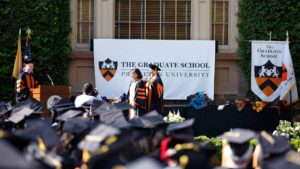Maybe someday I’ll write the full story of why I didn’t attend my first Princeton graduation, but for now, I am grateful that I got a second chance.
And what a chance! Thanks to Sarah-Jane Leslie, Dean of the Princeton Graduate School, I was invited to participate in the doctoral hooding ceremony that I was too young, stupid, and angry to attend the first time.
Instead of the acute sense of feeling like an alien creature (1978), I came back to Princeton as an elected trustee (2018). I still have that sense – how did I get here, to this board room, to this front row seat at commencement among these distinguished people – but I squash it with a stern self-lecture about “imposter syndrome” and get on with the business of lending my own voice, and my own experience, to the work of this great institution.
In 1978, I was (I think) the only one of my graduate school classmates to have attended public school and public college. I was the only one from an immigrant family, the only first generation graduate. My mother’s formal education ended in 8th grade with the Nazi invasion of Poland. She learned English when I did, at PS 148 in Jackson Heights, Queens.
As I looked out at the crowd of family and graduates at Commencement 2018, it wasn’t only joy I saw: it was the face of America. Princeton is no longer the place I knew – and that’s a good thing.
Oh yes, there is so much more to be done. This is no time for complacency. Princeton is taking on the complexities of admitting and supporting a diverse student class, the hard work of melding their wildly divergent backgrounds and expectations, and the imperative to prepare them for careers whose job descriptions have not yet been written. Good thing this set of challenges will be met with the extraordinary resources of Princeton, its gifted leadership under President Chris Eisgruber, its financial strength, and the legendary commitment of its talented and distinguished alumni.
It took a long time for me to shift from my anger at what Princeton had NOT done for me, to an appreciation for what it had done. Throughout the twists and turns of my career, those years at Princeton have been like a secret weapon, a turbo-charged reserve tank of renewable energy that gave me confidence to pursue jobs for which I had no qualifications other than my superb education.
And that’s what the future of education is all about: the confidence and the skills to learn how to learn.
You don’t need a hood to prove that. But I’m grateful for it, all the same.
